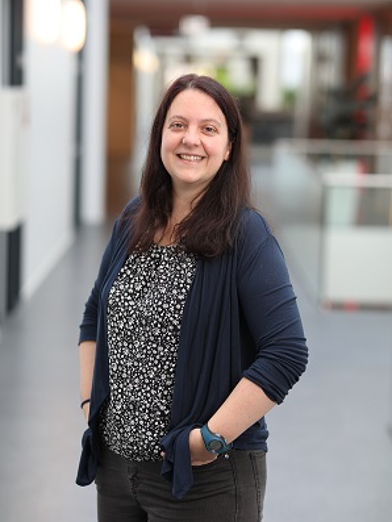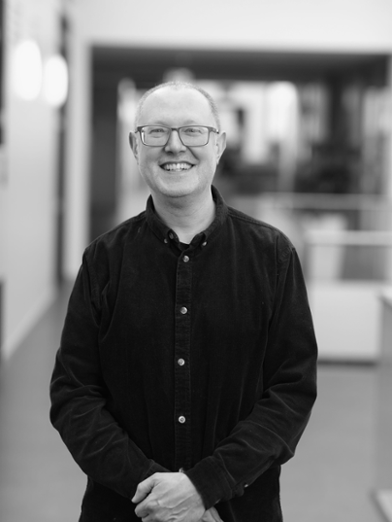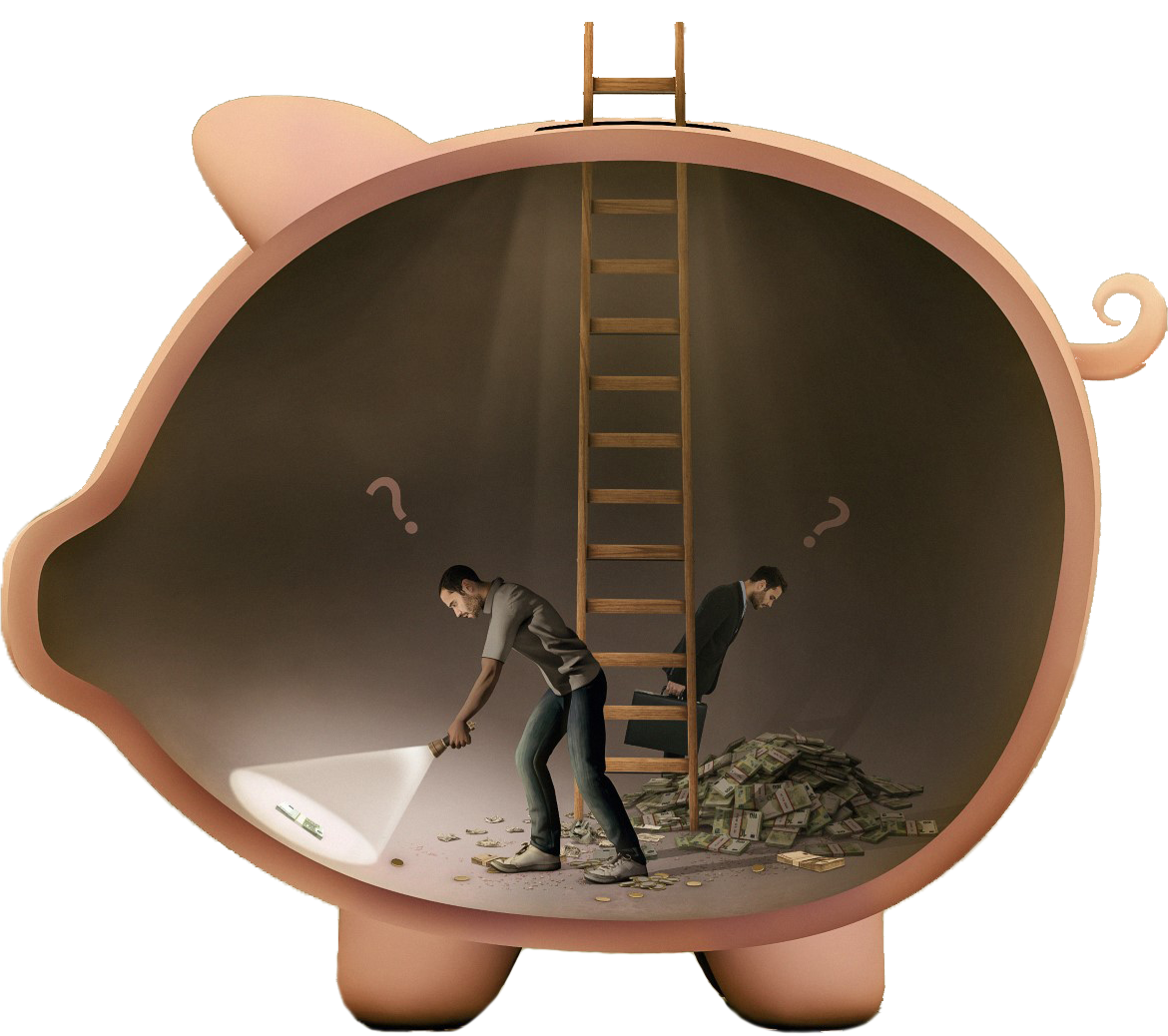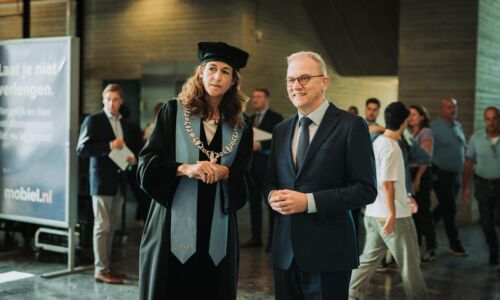Degrowth: economic disaster or ecological panacea?
The economy is growing, but the planet is becoming depleted. A growing number of scientists argue that economic stabilisation or even decline is the only way forward. Other experts find this idea radical and unwise.
Solar panels on every roof, and everyone their own Tesla, including a charging cord mat so the neighbour doesn’t trip. For some this sounds like a dream, for others like an untenable vision of the future. The debate between green growthists and so-called degrowthists is growing into a classic dispute. Both camps are also represented at Radboud University.
The French Juliette Alenda-Demoutiez found the idea of degrowth interesting before she had ever even heard of the term. Alenda-Demoutiez is Assistant Professor of Economic Theory and Policy at Radboud University. ‘Degrowth is one of the things I focus on in my research on sustainability transformations,’ she says. ‘It could offer us a way out of the climate crisis.’
‘Replacing the capitalistic system isn’t easy, but it can be done’
Human geographer Karolien van Teijlingen, like Alenda-Demoutiez, is also in the degrowth camp. Ideally, she would like to see a radical change in course. ‘We’re running into planetary limits because economic growth takes priority,’ she explains. ‘Capitalism has been around for a long time. Replacing that system isn’t easy, but it can be done. We need to move towards an economy that promotes human, climate, and environmental well-being. Economic growth isn’t a must for that.’
The economy has grown rapidly since the 1970s, but Dutch people’s level of satisfaction hasn’t increased proportionally, says Van Teijlingen. This makes one wonder what exactly the sacred idea of growth, so deeply ingrained in Western culture, brings us.
Green dreams
Degrowth adepts are often accused of not having their facts straight. But Van Teijlingen tries on the contrary to back her arguments with figures, for instance when it comes to green growth. ‘I’ve heard it said so many times that we should all drive electric cars and fill the Sahara with solar panels. But when I look closely at the statistics I see that an electric car uses eight times more copper than a normal car. So we would need eight times more copper mines than for our current fossil-fuel cars with internal combustion engines. And those mines won’t be located in the woods near Radboud University, but in the Amazon.’
As part of her research, Van Teijlingen has made a number of visits to copper and gold mines in Brazil and Ecuador. ‘I know indigenous leaders who were killed for opposing the coming of a mine, and I’ve interviewed residents who were chased off their land. For us in the West, the electric car represents freedom and sustainability, but on the other side of the world, the expansion of the electric car fleet leads to lack of freedom and environmental damage.’
Her colleague Alenda-Demoutiez is researching the situation in African mines, where lithium, cobalt and copper are mined: raw materials needed to make green dreams come true. ‘One of my main research areas is Congo, where forests, people and animals are victims of cobalt mining. The environment there is under pressure and the industry is flourishing thanks to hazardous child labour.’
‘Degrowth living isn’t easy’
The three Nijmegen researchers share a sustainable vision of life. Karolien van Teijlingen has no driving licence, no car, buys ‘very few clothes’, and is a vegetarian. Alenda-Demoutiez eats less meat, often opts for public transport or cycling, and tries to repair things before buying something new.
André van Hoorn hardly ever buys meat, no longer sprays his garden, turns ‘saving energy into a sport’, and shares a car with his ex. ‘If you want to get richer, you have to be less needy. There is something to be said for curbing human nature via a sense of purpose and community.’
Flying is something all three researchers still do. ‘My partner is from Ecuador,’ says degrowthist Van Teijlingen. ‘I fly there once every two years and combine it with a work trip. If I measure myself on the CO2 yardstick, it doesn’t look great: it’s really hard to be a degrowthist and really live by it.’
Van Hoorn has a flight scheduled soon to a conference in Stockholm (he stresses that it is not paid for by the University). ‘I could go by train, but with two young children at home, it’s too long a journey. In Stockholm, we comment on each other’s work. Knowledge exchange benefits from physical proximity; it works better than in an online meeting.’
Degrowthist Juliette Alenda-Demoutiez also flies for her work. ‘Unfortunately, I still have to fly because my expertise is participatory policy around climate change in Africa. I looked into whether I could go there by train and boat, but it’s too expensive. With colleagues from around the world, I’m now thinking much more about co-creation and collaboration, so there is less need for flying. By the way, I also have a car because I have family and friends in very remote places in France that are almost impossible to reach by public transport.’
Van Teijlingen would welcome a world with less consumption. Why should everyone have their own car? Their own drill? Their own lawnmower? Neighbours can easily share a lawnmower. ‘For example, I personally make use of community supported agriculture. It works as follows: if it takes producers two hours to produce my food, I pay them what I earn myself in two hours.’
Asked whether this kind of exchange will not ultimately lead to a communist system, Van Teijlingen replies that this is not something she is necessarily against. ‘If you look at the statistics, you see that Cuba has a reasonable level of development and a limited ecological footprint. The country may not be democratic, but healthcare and education are pretty good, while emissions are within limits. Our capitalist economy gifts us great freedom, proponents say. You should ask yourself what this freedom is worth if the planet suffers as a result.’
Static vision
Professor of Economics André van Hoorn doesn’t believe the planet will fall victim to more, more, more. He is convinced that growth is also possible within the earth’s boundaries. He does think it is realistic for everyone to eventually be able to drive an electric car. If you extend today’s calculations, then indeed we need too much copper, as Van Teijlingen argues. But, Van Hoorn argues, that is a static view. ‘If copper really is a limiting factor, we will come up with other solutions. First we walked, then we rode horses, and now we drive vehicles with internal combustion engines. Every time we hit a limit, we push beyond it. Degrowth removes that incentive.’
‘Degrowth will make us poorer’
Not only that, but degrowth will make us poorer, he thinks. And it inhibits innovation. Van Hoorn strongly opposes the idea that the economy should stop growing. ‘Development costs money. Inventions used to be reserved for the wealthy nobility. Isaac Newton discovered gravity because he had money and therefore also time for research. And look at our healthcare system, which is incredibly expensive, partly because we are capable of doing fantastic surgery and developing amazing drugs.’
Alenda-Demoutiez often hears that if degrowth leads to less money in the coffers, healthcare may suffer. According to her, medicine, machinery, materials and knowledge (and prosperity in general) are now mostly concentrated in rich countries. ‘In the current system, it is therefore primarily the rich countries that decide what to invest in. As a result, relatively little money goes to a malaria vaccine, for example. An important aspect of degrowth is that wealth is distributed more equally and democratically. Programmes around welfare and health should be funded without the need for a constantly growing economy.’
Cultural shift
She uses the term ‘systemic change’ a lot in her speech. As far as she is concerned, this involves much more than economic values alone. She thinks people should focus more on communality than on individuality, which will benefit mental well-being. And don’t forget infrastructure, she says. Very specifically, the presence of bicycle lanes in a country. ‘Systems may or may not make a more sustainable life possible. In the Netherlands, I cycle a lot, but in France it’s almost impossible – it’s far too dangerous. We need to make room for healthy or green cities.’
New Vox
This story is part of the new Vox magazine, which is all about money. After some good years, the university is back to budget cuts. And not just the university, but its students as well, with the cost of living on a steep incline. Fortunately, the return of the basic study grant can help to stop the bleeding. Next week, you can find the latest issue in the stands all over campus.
Van Teijlingen speaks of the cultural shift that is needed for degrowth. She too mentions bicycles. ‘We think we can’t get people out of their cars, but we don’t even try to. I could park my car for free in front of my door, but my cargo bike isn’t allowed there, even though I use it to transport three people. We also thought it was impossible to fly to the moon, although that may not be the best example in terms of CO2 emissions,’ she says, laughing.
She believes that the University could lead by example. ‘In terms of housing, for example, by recycling buildings. I personally have an office in the super-deluxe Maria Montessori building. The idea is that a big, beautiful, new building should be made of new materials. You can be critical of that. And more generally, you can ask yourself what you are training your own students for, what idea of success you are giving them.’
This article was written by Daan Appels









